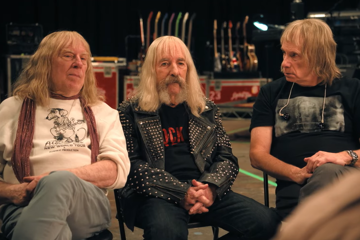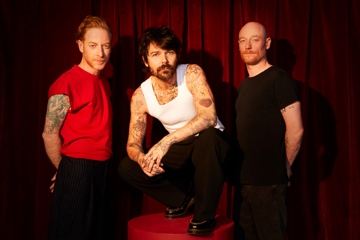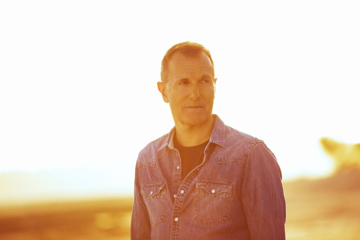Leaving All The Weight Behind
"I used to yell at my mom, when she wouldn’t let me do things, I’d go to my room and slam the door and yell: ‘I’m moving to Australia!’ I don’t know where the fuck I got it from; I was, like, apparently three years old."

"You have no idea how excited I am about going to Australia,” beams Este Haim, the bass-playing, face-pulling eldest sister in the upwardly-mobile sibling-trio Haim. Riding a wave of exuberant hype, especially in the UK press, the band have been earmarked for big things long before a debut album's materialised, and will soon be arriving in Australia for their first-ever shows in our parts: a pair of dates in Sydney and Melbourne and a slot at Splendour In The Grass. “Oh, I know the schedule, my friend,” boasts Este. “I know it like the back of my hand.”
“It's been a dream of mine since I was a kid to come to Australia,” Este explains. “I used to yell at my mom, when she wouldn't let me do things, I'd go to my room and slam the door and yell: 'I'm moving to Australia!' I don't know where the fuck I got it from; I was, like, apparently three years old. Safe to say I've always wanted to go to Australia. It only took 25 years, but here I am! Look at me now, Ma: living the dream!”
The incredibly-talkative 27-year-old has spent most of that 25 years playing music. The eldest daughter of a drummer father named Mordechai – “I think he comes from Jewish gypsy blood” – Este was first sat behind a drum kit from “the time [she] could hold her head up”, and could hold a beat from the time she was four. Aside from various childhood flirtations with the circus – from learning trapeze tricks and how to ride a unicycle as a ten-year-old at a Club Med vacation in Ixtapa-Zihuatanejo, Mexico to an obsession with the theatrics and costumes of Cirque du Soleil after seeing them play in Las Vegas as a 13-year-old – it's been music that's been at the core of Este's life. To the point where the moment she first picked up a bass has the feeling of a formative childhood experience.
“I still remember when my dad introduced me to the bass, how exciting it was,” Este recounts. “The bass, to me, was like the best of both worlds: I got to be the rhythm, but I also got to be melodic. I'm still excited about playing bass, because to me it's the foundation; it's the basis of the rhythm, but it's also the basis of the melody.”
Don't miss a beat with our FREE daily newsletter
When Este first wrote a song, though, she was in a less inspired place. “I wrote some pretty dramatic shit, as most 13 or 14-year-olds do. Like, oh my god, I wrote the most emo shit ever. I liked Dashboard Confessional! So anytime I liked a dude and he liked my friend, I'd write a song about how sad I was and how I wanted to kill myself. When you're 13 or 14, your hormones are going batshit crazy in your body, your brain is going a million miles an hour, you don't really know what you're saying or what you're feeling, so the things that come out of your mouth can be ridiculously extreme, a little overboard. And sometimes they sound like Chris Carraba C-sides,” she laughs, with self-mocking glee. “I wrote really emo shit for like four or five years. I still write really emo shit. Even now, to this day. We'll be writing and I'll say something like: 'And then I looked over the edge and thought: 'what if?''”
After a spirited rendition of her most beloved hopelessly-emo teenage song – “Take my heart/ Put it in a blender/ Put it on speed number ten!” – Este recalls how a pre-adolescent nu-metal/emo phase changed in a blink. “I saw The Strokes' Last Night video and that was like: 'Oh, wait, not into nu-metal anymore!'” she gags. “I feel like I went out the next day and bought a pair of skinny jeans and a '70s-looking jacket. I just tried my best to look like one of The Strokes, or at least the kind of girl they would like. Then I started getting into Elliott Smith and Rilo Kiley, wore glasses even though I didn't have a prescription – I was totally that girl. That's what happens when you're in high school, right? You're just trying to figure out who the fuck you are. And I went to an art school, so everyone was trying to be cool, not really knowing what they were doing. It was a whole school full of those girls.”
In high-school, Este and Haim's guitarist/vocalist/frontwoman Danielle, her now-24-year-old sister, had a stint in a contrived major label tween group, the Valli Girls; a play on their San Fernando Valley-girl upbringing, and a youthful evocation of Franki Valli. The band never went far, and, by university, Este took a completely different musical turn, studying ethnomusicology at UCLA. “My emphases were Brazilian percussion and Bulgarian folk singing,” she says. She also spent her time in college booking bands to play on campus. “I basically got to use UCLA as my own private piggy-bank, and pay bands I loved a lot of money to come and perform,” smiles Este. “I got Beach House to come play at noon to like 100 people, I got Diplo, Fool's Gold, Tokyo Police Club.”
When Este graduated college, youngest sister Alana was graduating high school, and Danielle was fresh off stints playing in the live bands for both Jenny Lewis and Julian Casablancas. They'd been playing sporadically as Haim for five years by then, but had never left Los Angeles, and had treated their band as a part-time, hobbyish kind of thing. It felt, to the sisters, like crossroads for their dreams. “We had to either totally commit to doing it or just move on with our lives,” Este recounts. “So we locked ourselves in Danielle's house for like a year and just wrote and wrote and wrote, from June of 2010 to June of 2011. I truly believe that songwriting is a muscle, and if you don't flex it, you're never going to get any better. So we decided to just do nothing but write songs.”
It was, basically, a year-long writer's retreat, which functioned as a kind of coming-of-age for all the sisters. Though Este was the oldest, she saw it as a transformative time; having long treated her diabetes casually, she devoted herself to exercise, became a vegan, and, though post-graduation, kept taking classes online for the sheer joy of it. That was reflected in the band's approach to writing.
“We started talking about how we were feeling, about the world, telling stories, retelling stories that friends had told us, reading things in the newspaper,” offers Este. “We just became, like, thirsty for life, as weird and completely stupid as that sounds. We just wanted to drink everything in, ingest it, interpret it, and turn it into a song.”
They came out with a bunch of songs, but then came the next step: capturing them on tape in a way that made them happy; a run of self-produced EPs from their early years each having left the band frustrated, wondering: “We sounded good live, why couldn't we sound good on record?”
For their breakout 2012 EP, Forever, the band worked with Childish Gambino producer Ludwig Göransson. And for their next single, 2013's Falling, and much of their forthcoming debut album, they've shacked up with Ariel Rechtshaid, the producer whose work with both glossy pop acts (Usher, Justin Bieber), acclaimed indie types (Vampire Weekend, Cass McCombs), and people in between (Sky Ferreira) makes him the perfect appointee for Haim's mixture of sunkissed, '70s AM radio melodies and syncopated, '90s R&B girl group rhythms.
The band's goal for their debut album was to “make the 2.0 version of the singles”. Says Este: “We just wanted to take it further, and we hope we did. We had a lot of fun making it, which hopefully translates to it being fun to listen to.”
And when will the world get to listen to Haim's much-anticipated debut LP? “Oh, god, I don't know,” Este laughs. “I wish it was just coming out tomorrow. I just want to put it out there. If I could, I would. But we've just gotta finishing mixing it, and then it'll be mastered, and then hopefully we can put a date on it. We're so close to being done with it; sometimes it feels like it's taking forever. I really love it and I'm really proud of it, but my patience isn't infinite.”







